Storyline
It's 1861 and civil war has broken out in America. From the Southern States, the Confederates fight to protect their way of life. From the North the Unionists struggle to re-unite America and abolish slavery.
Against the background of the most violent war in history a 'fascinating' Confederate tale of love, hate and vengeance unfolds. This is the story of Mathew J Fuller, his fiancée Polly Ann Stafford, Caleb Stone, a 'white trash' farmer and a 'Drifter'.

November 1860, Georgia - Story To Tell
Polly has a premonition in which she sees the collapse and destruction of the 'Old South' reflected in the face of a white haired gentleman planter. This song acts as a preface to the story.
December 1860, South Carolina - Dixie Hold On
At first, the drifter warns of the pressures on the South from the 'civilised North'. Then, realising the severity of a move to split the United States into two totally seperate commonwealths, which would have destroyed the strength of America, he advises caution and debate. But finally, his good sense withers under the strain of his Southern spirit and in the final verse he offers up 'fighting talk'.
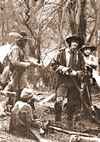
April 1861, Georgia - Join Around The Flag
Matthew, like the majority of young men at the time, is caught up in the wave that sweeps the South following the bombardment of Fort Sumter, the last remaining Union Army post in the newly formed Confederacy.
He exudes enthusiasm for his 'New Country'and its President Jefferson Davis and urges everyone to join in the bold adventure and support the cessation of the Southern states from the Union.
May 1861, Texas - White Trash
Enter the 'Redneck'Caleb. Like the majority of the 'White Trash', Caleb lived little better than the slaves and had been contemptuously tolerated and frowned on by the middle and upper classes - until now, when they needed him to fight.
In the first days of the war, Caleb is quick to join Colonel J. Hood's 4th Texas Volunteers and will soon be serving at such battles as Gaines's Mill, Manassas, Gettysburg and Chikamauga.
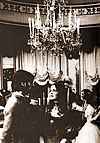
July 1861, Georgia - Last Dance & The Kentucky Racehorse
At a farewell ball at his father's fine home, beneath the glow of the Parisian chandeliers, Matthew and Polly say goodbye to each other before he rides off to join General Beauregard's Army in Virginia.
January 1862, Virginia - Southern Boys
The war is on and Caleb relates the initial success of the Confederacy in the opening year and reflects the general overconfident feeling in the South, that victory would soon be theirs.
However, this was to last as long as it would take the Union to organise its superior numbers of men, money and armaments into a properly trained and powerful army.
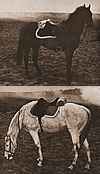
December 1862, Mississippi - The Union Mare & The Confederate Grey
The 'amateurish' approach to war that had at first prevailed on both sides was now giving way to the bitter relentless fighting on such shell-rutted battlefields as Gaines's Mill, Antietam and Fredricksburg.
Like the Drifter, many people were beginning to grasp the terrible horror of what was happening and they were starting to regret their initial desire to fight their political arguments with weapons rather than continue with words. What they had started was not to end for another three bloody years.

August 1863, Virginia - No One Would Believe A Summer Could Be So Cold
In a letter to Polly, Matthew now disillusioned and uncertain of a Confederate victory, writes of the woes of war. Robert Lee's loss to General Meade's Union Army at the battle of Gettysburg (the climax of Lee's drive into the heart of the North) was catastrophic.
Not only did Lee lose 28,063 men (one third of his army), but all hopes of support for the Confederacy from the governments of Britain and France are finally dashed - the tide has turned.

September 1864, Louisiana - The Southland's Bleeding
The Drifter realises that although Lee is still winning some battles, the very fabric of the South is crumbling under the strain. Old fashioned plantation owners could not administrate or supply a country at war, nor did they have the means by which to do so.
The pride of the South, J. E. B. Stuart's cavalry had been smashed, the Shenendoah valley had been devastated by Sheridan and soon Atlanta was to fall followed by the demise of General Hood's entire army at Nashville.
The desertion rate was shocking, and Grant would not exchange prisoners which severely threatened the South's depleted manpower. This failure to do so produced atrocious situations such as that at Andersonville Prison in Georgia where 14,000 Union prisoners died of malnutrition and disease, partly through horrible mismanagement, and partly due to the lack of food and medical supplies available in the Confederacy.
It was time to quit, but foolishly they would not until April of the following year.
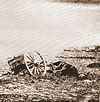
April 1865, Virginia - Bring Up The 12-Pounders
By March '65 the Armies of the South were shattered. Badly armed, poorly provisioned and undermanned, Lee's bedraggled forces were smashed as Grant tore through them at Petersburg, Virginia. Meanwhile, further south Union General Sherman had outwitted General Hood and had driven through Georgia and South Carolina bringing Dixie to its knees. Lee saw that there was no hope for his starving and depleted Army and so, on April 9th, he surrendered to Ulysses Grant at the Virginia village of Appamattox Courthouse.
Prior to the surrender we find the exhausted Matthew hopelessly ordering up 12-Pound artillery that no longer exists, in a vain attempt to hold on. Matthew is replied to by the ghosts of the Confederate dead.
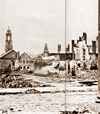
May 1865, Georgia - They Laid Waste To Our Land
When Caleb, Matthew, and the Drifter return to their homes in the South after the surrender, they see the devastation that was brought to Georgia a few months before the end of the war by Sherman's March to the sea. This was a move designed to knock the wind out of the South and was enforced with unnecessary relish.
On April 14th, 1865, Abraham Lincoln was tradgically assassinated by John Wilkes Booth, a Southern fanatic. Lincoln's death was a great loss to the defeated Confederacy because he had planned the reconstruction of the Union with 'malice toward none' and 'charity for all'.
Without the strength of Lincoln to bring magnanimity to the 'reunion' of the states, the federal government treated the surrendered 'rebels' harshly and with bitterness.

May 1865 - Praise the Lord
In the main, when the negro slaves were set free at the end of the war, they were disillusioned. For the most part, these unfortunate people were in fact, no better off and in many cases their conditions were worse because they were no longer fed and cared for by the old masters. Thousands lived as virtual 'slaves' in the northern factories and no real effort was made to integrate them with the whites but bondage is the most odious state for a human being to be in, and however rocky the road at the beginning of freedom, it was a completely worthwhile journey.
Obviously, the 'great jubilee of the unshackling of the chains' was met with tremendous joy by these Southern negroes.

March 1866, Alabama - The King Has Called Me Home
Sickened by the sights he had seen and his own callous attitude to life, Caleb finds solace from the scriptures.
Although he came from the humblest of backgrounds, the Bible was to be found in his home. Indeed his mother often read it to him as a child and whatever lessons he had picked up from it would have been the closest he came to any formal education.
Now he finds a new interest in the teachings of the Lord, and goes from town to town preaching 'fire and brimstone' sermons - It is possible, however, that his taking up of 'the cloth' has not necessarily cured him of his drinking habits.
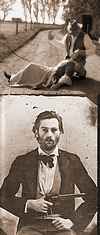
February 1867, Arkansas - Bad Man
When Matthew returns home to Georgia he finds that nothing of his former life remains. His fine plantation home has been raised to the ground, those members of his family that are still alive have fled to avoid persecution, but worst of all, his darling Polly has died. Matthew is shattered.
Around him, Dixie is in hopeless turmoil. Poverty and sickness are rife amongst the Southerners. Greed and corruption are abundant in the people with official positions, and Northerners vindictively humble the 'rebels'. Carpetbaggers exploit those who due to privation, excessive taxation and general misfortune have to sell their property, land and valuables at a pittance.
It was hard for men like Matthew, who had lived a 'privileged' life, to accept, and harder still, since many of them had nothing left to lose.
The laws were often unfair - Matthew, driven by deep hate, chooses to live outside of them.
Dixie, Now You're Done
The Drifter concludes, the story is over.